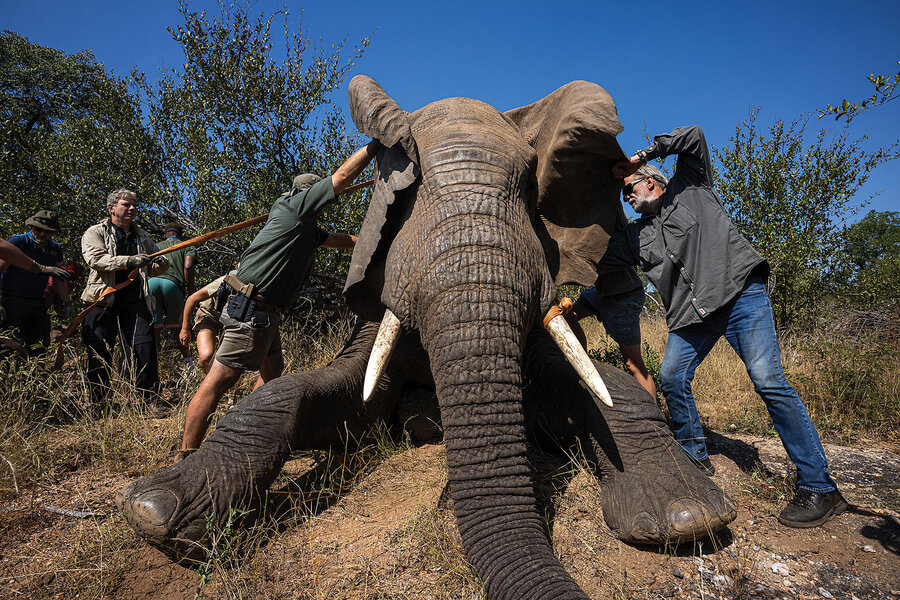Project ‘Frozen Dumbo’ helps boost dwindling African elephant populations
Loading...
| SELATI GAME RESERVE, SOUTH AFRICA
Poaching, habitat destruction, and climate change have decimated wild African elephant populations and pushed the animals into endangered-species territory. An international project called Operation Frozen Dumbo aims to bolster elephant populations in the wild and in the world’s zoos.
Above a herd of elephants in the Selati Game Reserve in South Africa, helicopter pilot Jana Meyer and wildlife veterinarian Hayden Cuthill scan the bush for the most worthy-looking bull elephant. Once their target is selected, Ms. Meyer deftly maneuvers her aircraft to separate the animal from the herd. Dr. Cuthill quickly estimates the male’s weight and prepares the tranquilizer dose. He fixes the ampul atop a special dart, which he shoots directly into the male’s left flank.
Why We Wrote This
At their best, zoos inspire a conservation mind-set among visitors. But many European facilities populate exhibits with elephants taken from the wild. One international project offers an alternative.
A team on the ground will collect the elephant’s sperm as part of the Frozen Dumbo project. The samples collected in the wild are cryogenically frozen and shipped to a consortium of European zoos, which use them to artificially inseminate their females.
Thomas Hildebrandt of the Leibniz Institute for Zoo and Wildlife Research, who has overseen the successful artificial insemination of more than 50 female elephants, is passionate about his goal: “We have to stop populating the European zoos with animals from the wild.”
Above a herd of elephants in the Selati Game Reserve in South Africa, helicopter pilot Jana Meyer and wildlife veterinarian Hayden Cuthill scan the bush for the most worthy-looking bull elephant.
Once their target is selected, Ms. Meyer deftly maneuvers her aircraft to separate the animal from the herd. Dr. Cuthill quickly estimates the male’s weight and prepares the tranquilizer dose. He fixes the ampul atop a special dart, which he shoots directly into the male’s left flank.
A team on the ground will collect the elephant’s sperm as part of an ongoing international effort to improve elephant fertility, a project called Operation Frozen Dumbo. The samples collected in the wild are cryogenically frozen and shipped to a consortium of European zoos, which use them to artificially inseminate their females.
Why We Wrote This
At their best, zoos inspire a conservation mind-set among visitors. But many European facilities populate exhibits with elephants taken from the wild. One international project offers an alternative.
This avoids the importation of wild elephants.
Factors such as poaching, habitat destruction, and climate change have decimated wild African elephant populations and pushed the animals into endangered-species territory. The Frozen Dumbo project aims to bolster elephant populations in the wild and in the world’s zoos.
Back at Selati, the sedated male – dubbed The Sperminator – issues a series of loud grunts. A volunteer keeps the tip of his trunk dilated with a wooden stick to ensure the animal’s breathing.
Elephants draw air exclusively through their trunks, so if anything blocks this double-channel pathway, the animal could quickly die. Elephants cannot breathe through their mouths like other land mammals – a trait inherited from their aquatic ancestors.
This is the fifth day of the Selati sperm-collecting expedition, which has been largely unsuccessful.
Everyone on the team is relieved when an ultrasound performed by the project’s lead scientist, Thomas Hildebrandt of the Leibniz Institute for Zoo and Wildlife Research, shows the animal’s reproductive potential to be high. His semen is extracted into vials that will then be flown by helicopter to a field lab to be gradually frozen. These will be shipped to a cryobank at ZooParc de Beauval in France.
Dr. Hildebrandt, who has overseen the successful artificial insemination of more than 50 female elephants, is passionate about his goal: “We have to stop populating the European zoos with animals from the wild,” he says. “Instead, we only need to import the sperm and the egg cells.”














